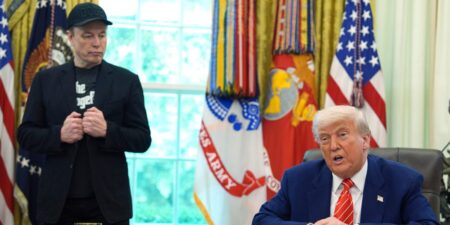A year ago, Glenn Hopper was advising just a handful of company leaders on how to embed AI agents and tools like ChatGPT throughout their organizations. Today, the Memphis-based AI strategist has an extensive waitlist of C-suite executives seeking his help with those tasks and more.
“This technology is moving so fast, the gap between what CEOs need to know and what they actually understand is massive,” said Hopper, a former finance chief and author of the 2024 book “AI Mastery for Finance Professionals: Foundations, Techniques, and Applications.” That’s why so many bosses are knocking on his door, he told Business Insider.
Leadership coaches and consultants have long helped CEOs navigate the pressures of the corner office. Now, executive sherpas who were early to embrace AI say they’re seeing a spike in CEOs seeking guidance on everything from vetting vendors and establishing safety protocols to preparing for the next big wave of AI breakthroughs.
“Everything is inbound,” said Conor Grennan, chief of AI Mindset, an AI consulting and training firm he founded in 2023. “We have a list a mile long.”
Grennan, also chief AI architect at New York University’s Stern School of Business, said company leaders often reach out after struggling to get employees to adopt AI. They see other CEOs touting AI’s benefits, and so they’re feeling like they’re behind, he said.
‘It was garbage in, garbage out’
Some of the AI gurus that company leaders are tapping helm (or work at) startups that were launched in recent years to take advantage of the AI boom. Others head up new or expanded AI teams within established advisory firms.
Lan Guan was named Accenture’s first chief AI officer in 2023, two decades after joining the professional-services firm. She’s since been counseling a growing number of company leaders on how to bring AI into their organizations.
“CEOs need an AI translator to basically sift through all this noise,” she said. “The amount of signals you’re getting, the amount of noise, it’s so distracting.”
Company leaders are also seeking out AI gurus in some cases to fix mistakes they made while going at it alone. Guan recalled one CEO who came to her after the person’s company had to pause a multi-million dollar investment in a custom AI model because employees trained it on dozens of different versions of the same operating procedure.
“When they tried to scale, their data was not clean enough,” she said. “It was garbage in, garbage out.”
Amos Susskind, CEO and founder of the London beauty-tech startup Noli, has been tapping Guan and members of her team for AI-related guidance for the past year. Noli’s roughly 20 employees have been using AI tools to do their jobs and the company’s beauty-product recommendation platform is powered by AI.
“I’m in touch with AI leaders in Accenture probably five times a day,” said Susskind, who previously led L’Oreal’s consumer-products division for the U.K. and Ireland.
Shaping the AI narrative leaders use
Last year, 78% of workers said their organizations had used AI in at least one function, up from 55% in 2023, according to a March survey by global management consulting firm McKinsey.
Companies are planning to dig into AI even more this year. A May survey from professional-services firm PricewaterhouseCoopers found that 88% of senior executives planned to increase their AI-related budgets in the next 12 months.
“AI is in line with, if not bigger than, the internet,” said Dan Priest, chief AI officer of PwC, whose position was created last year.
Public company CEOs mentioned “agentic AI” — AI systems capable of acting autonomously — and similar terms on 269 conference calls in the second quarter, up from 12 during the same period last year, according to AI research firm AlphaSense.
Getting those AI mentions right is another reason why company leaders are leaning on AI sages. CEOs need to consider more than just how investors and analysts interpret their remarks, said Priest. Employees are listening, too, and workplace experts say heightened anxiety among personnel can dent productivity and drive up turnover.
“You want to be careful,” warned Priest, who helps CEOs communicate their AI strategy externally. “The second you start talking about AI efficiencies, it makes your teams very nervous.”
CEOs also need to make sure employees using AI are doing so safely, said Hopper, the AI strategist in Memphis.
“If you try to have too prohibitive a policy or don’t have a policy at all, that’s when people are going to do stupid stuff with data,” he said.
While CEOs may not want to be involved in every AI process or initiative happening at their companies, Hopper said the more hands-on experience they get with the technology, the better equipped they’ll be to make smart decisions about how their organizations can benefit from it.
Michael White, chief of MashTank, a boutique management consulting firm near Philadelphia, became one of Hopper’s clients last year. Though he considers himself tech-savvy, White said Hopper got him up to speed on AI faster than he could’ve on his own.
“We now have a bot that knows a lot of what I know, but has a better memory than I do,” said White. Without an AI whisperer like Hopper, he added, “I’d still be at the starting gate.”
Read the full article here
















